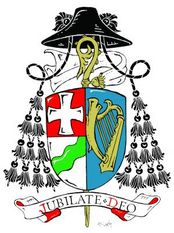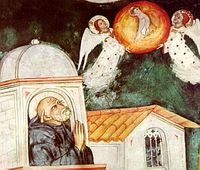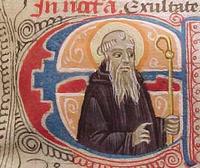When Rev. Mother Dolores Hart walked away from her life as an actress in Hollywood to become a nun in Connecticut, she thought she had put acting behind her.

When Rev. Mother Dolores Hart walked away from her life as an actress in Hollywood to become a nun in Connecticut, she thought she had put acting behind her.

Let all guests who arrive be received as Christ, because He will say: "I
 was a stranger and you took Me in" (Mt 25:35). And let due honor be shown to all, especially to those "of the household of the faith" (Gal 6:10) and to wayfarers. (Rule of Saint Benedict, 53)
was a stranger and you took Me in" (Mt 25:35). And let due honor be shown to all, especially to those "of the household of the faith" (Gal 6:10) and to wayfarers. (Rule of Saint Benedict, 53)
The New York Times Travel section today has a good article promoting monastic guesthouses. The author Jane Margolies has an appreciation for the simplicity and serenity of the monastic cloister which in turn welcomes travelers. Read the article
and consider a monastery guest on your next trip.As you know, the Benedictine Abbots and Abbesses met in Rome in September. and there was a meeting of the Benedictines with the Holy Father. I posted the Holy Father's address already and now I am offering the Abbot Primate's address for your consideration. I am most grateful to Father Abbot Primate Notker for sharing the English translation of his remarks.
 Address of the Abbot Primate on the Occasion of the Audience with the Holy Father on 20th September 2008, at Castelgandolfo
Address of the Abbot Primate on the Occasion of the Audience with the Holy Father on 20th September 2008, at Castelgandolfo
Holy Father,
Every four years we, the Benedictine Abbots, come to Rome to celebrate our International Congress. We reflect on the impact of Saint Benedict's spiritual patrimony on the world of today, we discuss our common project, that is, Sant'Anselmo as a monastic and academic entity. We have also invited representatives of the 'Communio Internationalis Benedictinarum', of the Orthodox Churches and of the Anglican Benedictines. Today, we have come to Castelgandolfo to greet you, to listen to your words and to receive your blessing. We come to you with the greatest sense of esteem and gratitude.
One of your great desires is the rebirth of a Christian Europe on the basis of Saint Benedict's principles. We hope that our monasteries may be spritiual and cultural centres which will strongly influence their surroundings. Many people, both young and grown-up, come to our monasteries and join us in prayer and in the liturgy. The welcoming of guests in our monasteries and retreat houses, or the welcoming of students in our schools is our contribution towards the Church's witness and a deepening of the Faith.
This is true not only in Europe but all over the world. 150.000 young people are being educated in our schools. To help this work, we have established a network among those responsible in order more effectively to develop our Benedictine profile.
Already for centuries Benedictine monasteries have been growing outside of Europe, as
 you will have noticed in Brazil. Today, in an era of globalisation, Saint Benedict's message is spreading throuhghout the world. Every year more than four new foundations are made, in Eastern Europe and as far away as Kazakhstan. Shortly, there will be a new foundation in Cuba. The official Church in China has sent a group of young priests to Sankt Ottilien to be formed as Benedictines with a view to starting a community in this country so dear to your heart.
you will have noticed in Brazil. Today, in an era of globalisation, Saint Benedict's message is spreading throuhghout the world. Every year more than four new foundations are made, in Eastern Europe and as far away as Kazakhstan. Shortly, there will be a new foundation in Cuba. The official Church in China has sent a group of young priests to Sankt Ottilien to be formed as Benedictines with a view to starting a community in this country so dear to your heart.
We have no reason to be dissatisfied. In some parts of the world, such as Asia and Africa, there are many vocations, and even in Europe they are not lacking. But some communities have been waiting for years for new members and do not know what the future holds. For this reason some houses will be forced to close. Where there are no children and there is no faith the seed-ground for vocations does not exist.
Sant'Anselmo with its Pontifical Athenaeum and Pontifical College plays a particular role. In the last century, Sant'Anselmo was the unifying centre of formation, of contact and of common life for the many monastic observances and nations. At this time of globalisation Sant'Anselmo has become even more important in furthering the unity of the Confederation. For this reason we are grateful to you for having finally clarified the issue of the ownwership of Sant'Anselmo, by granting us officially the free use of the property. With the Pontifical Liturgical Institute we make a special contribution to the Universal Church.
In recent years there has been a growing interest among many laypeople anxious to conduct their lives in accordance with the spirit of the Rule of Saint Benedict. Always attached to a specific monastic community, they try to witness in the world that, only be being rooted in God can they develop the fulness of a truly human life. We have already celebrated one World Congress of Oblates where experiences were shared on an international level and new courage and zeal built up. At present we are preparing the second such Congress.
I should not like to conclude without mentioning our sisters, that is our Benedictine nuns and sisters. They bear witness in a special way in the heart of the Church to the contemplative element and to service of the poor. Their number is double that of the monks but they live a more hidden life than the monks. Together we try to carry on the precious patrimony of Our Holy Father Saint Benedict, the Patron of Europe, but who in the future, like Abraham, may come to be called 'the Father of many peoples'.
Holy Father, once again we thank you for this generous meeting and humbly ask your paternal blessing.
Abbot Primate
Do you have a minute? Do you know how to live rightly? Do you want to know how to live as God wants us to live? Do you have a monk to help you with finding your way through
 life? I do. There's a monk who will help you in your search for God: One Minute Monk.
life? I do. There's a monk who will help you in your search for God: One Minute Monk.
The search for meaning and substance in one's life is perennial. Seeking God, quaerere Deum, is the first mark of the Rule of Saint Benedict: does the person truly seek God? Hence you might say that a basic impulse for those wanting to be monks and nuns, or as oblates and average people, is the desire of God. Pope Benedict spoke of the life of the monks and nuns in a speech he gave at the Collège des Bernardins: Meeting with representatives from the world of culture, 12 September 2008:
Amid the confusion of the times, in which nothing seemed permanent, they wanted to do the essential - to make an effort to find what was perennially valid and lasting, life itself. They were searching for God. They wanted to go from the inessential to the essential, to the only truly important and reliable thing there is. It is sometimes said that they were "eschatologically" oriented. But this is not to be understood in a temporal sense, as if they were looking ahead to the end of the world or to their own death, but in an existential sense: they were seeking the definitive behind the provisional. Quaerere Deum: because they were Christians, this was not an expedition into a trackless wilderness, a search leading them into total darkness. God himself had provided signposts, indeed he had marked out a path which was theirs to find and to follow. This path was his word, which had been disclosed to men in the books of the sacred Scriptures. Thus, by inner necessity, the search for God demands a culture of the word or - as [Benedictine Father] Jean Leclercq put it: eschatology and grammar are intimately connected with one another in Western monasticism (cf. The Love of Learning and the Desire for God). The longing for God, the desire for God, includes the love of learning, love of the word, exploration of all its dimensions. Because in the biblical word God comes towards us and we towards him, we must learn to penetrate the secret of language, to understand it in its construction and in the manner of its expression. Thus it is through the search for God that the secular sciences take on their importance, sciences which show us the path towards language. Because the search for God required the culture of the word, it was appropriate that the monastery should have a library, pointing out pathways to the word. It was also appropriate to have a school, in which these pathways could be opened up. Benedict calls the monastery a dominici servitii schola. The monastery serves eruditio, the formation and education of man - a formation whose ultimate aim is that man should learn how to serve God. But it also includes the formation of reason - education - through which man learns to perceive, in the midst of words, the Word itself.
Abbot Placid is hosting One Minute Monk as a way to help us seek God and to live rightly. Abbot Placid is the religious superior of the monks at Belmont Abbey and Chancellor of Belmont Abbey College is presenting concrete ways for us to seek God by using technology to make the Rule of Saint Benedict accessible. He's showing us the "signposts" for the path to God and for good living that Pope Benedict says God has already given to us. The Rule of Saint Benedict is timeless because its proposal corresponds to desires of our heart and One Minute Monk will help you understand these desires.
To order a copy of the Rule of Saint Benedict visit this link.
In the Catholic press...
 Address of His Holiness Benedict XVI
Address of His Holiness Benedict XVI
Papal Summer Residence, Castel Gandolfo
Saturday, 20 September 2008
Dear Father Abbots,
Dear Sister Abbesses,
I receive you with great joy on the occasion of the International Congress for which all the Abbots of your Confederation and the Superiors of independent Priories meet in Rome every four years to reflect on and discuss ways to embody the Benedictine charism in the present social and cultural context and respond to its ever new challenges to Gospel witness. I first greet the Abbot Primate, Dom Notker Wolf and thank him for what he has said on behalf of all. I likewise greet the group of Abbesses who have come representing the Communio Internationalis Benedictinarum, as well as the Orthodox Representatives.
In a secularized world and an epoch marked by a disturbing culture of emptiness and meaninglessness, you are called to proclaim the primacy of God without compromise and to advance proposals for possible new forms of evangelization. The commitment to personal and communitarian sanctification that you pursue and the liturgical prayer that you encourage equip you for a particularly effective witness. In your monasteries, you are the first to renew and to deepen daily the encounter with the Person of Christ, whom you always have with you as guest, companion and friend. For this reason your convents are places where in our time too men and women hasten to seek God and learn to recognize the signs of Christ's presence, charity and mercy. With humble trust, you never tire of sharing with those who turn to your spiritual care the riches of the Gospel message, which are summed up in the proclamation of the love of the merciful Father who is ready to embrace every person in Christ. Thus you will continue to make your precious contribution to the vitality and sanctification of the People of God, in accordance with the special charism of Benedict of Norcia.
Dear Abbots and Abbesses, you are custodians of the patrimony of a spirituality anchored radically to the Gospel, "per ducatum evangelii pergamus itinera eius", as St Benedict says in the Prologue to the Rule. It is precisely this that engages you to communicate and give to others the fruits of your inner experience. I know and deeply appreciate the generous and competent cultural and formative work carried out by so many of your monasteries, especially for the young generations, creating an atmosphere of brotherly acceptance that favours a unique experience of Church. In fact, it is of primary importance to prepare young people to face their future and measure up to the many demands of society, having as a constant reference the Gospel message, which is ever timely, inexhaustible and life-giving. Devote yourselves, therefore, with fresh apostolic zeal to youth who are the future of the Church and of humanity. Indeed to build a "new" Europe it is necessary to start with the new generations, offering them the possibility of coming into close contact with the spiritual treasure of the liturgy, of meditation and of lectio divina.
This pastoral and formative action is in fact more necessary than ever for the whole human family. In many parts of the world, especially Asia and Africa, there is a pressing need for vibrant places of encounter with the Lord, in which, through prayer and contemplation, the individual may recover peace with himself and peace with others. Therefore, do not fail to meet with an open heart the expectations of all those, outside of Europe too, who express a keen desire for your presence and your apostolate in order to draw from the riches of Benedictine spirituality. Let yourselves be guided by the deep desire to serve every person charitably, irrespective of their race or religion. With prophetic freedom and wise discernment, may your presence be meaningful wherever Providence calls you to settle, always distinguishing yourselves for the harmonious balance of prayer and work that is a feature of your way of life.
 And what should be said of the famous Benedictine hospitality? It is a special vocation of yours, an experience that is fully spiritual, human and cultural. May balance exist here too: may the heart of the community be wide open but in proportion to the times and forms of hospitality. You will thus give the men and women of our day a possibility of deepening the meaning of life within the infinite horizon of Christian hope, cultivating inner silence in communion with the Word of salvation. A community capable of authentic fraternal life, fervent in liturgical prayer, in study, in work, in cordial availability to your neighbour who is thirsting for God, is the best impetus for inspiring in hearts, especially those of young men, the vocation to monastic life and in general a fruitful journey of faith.
And what should be said of the famous Benedictine hospitality? It is a special vocation of yours, an experience that is fully spiritual, human and cultural. May balance exist here too: may the heart of the community be wide open but in proportion to the times and forms of hospitality. You will thus give the men and women of our day a possibility of deepening the meaning of life within the infinite horizon of Christian hope, cultivating inner silence in communion with the Word of salvation. A community capable of authentic fraternal life, fervent in liturgical prayer, in study, in work, in cordial availability to your neighbour who is thirsting for God, is the best impetus for inspiring in hearts, especially those of young men, the vocation to monastic life and in general a fruitful journey of faith.
I would like to address a special word to the representatives of the Benedictine nuns and sisters. Dear sisters, like other religious families you too are suffering from the lack of new religious vocations. Do not let yourselves be disheartened but face these painful situations of crisis calmly, aware that it is not so much success that is asked of each one as faithful commitment.
What should be absolutely avoided is a weakening of spiritual attachment to the Lord and to one's vocation and mission. On the contrary, by persevering in it faithfully we profess most effectively, also to the world, our firm trust in the Lord of history, in whose hands are all the times and destinies of individuals, institutions and peoples; and let us also entrust ourselves to him with regard to the actuation in history of his gifts. Make your own the spiritual attitude of the Virgin Mary, happy to be the "ancilla Domini", totally available to do the will of the heavenly Father.
Dear monks, nuns and sisters, thank you for this pleasant visit! I accompany you with my prayers so that at your meetings during these days of your Congress you may discern the most appropriate ways to witness visibly and clearly in your life-style, work and prayer, to your commitment to a radical imitation of the Lord. May Mary Most Holy sustain your every project of good, help you above all to keep God before your eyes and accompany you maternally on your journey. As I invoke an abundance of heavenly gifts to support all of your generous resolutions, I warmly impart a special Apostolic Blessing to you and to the entire Benedictine Family.
© Copyright 2008 - Libreria Editrice Vaticana